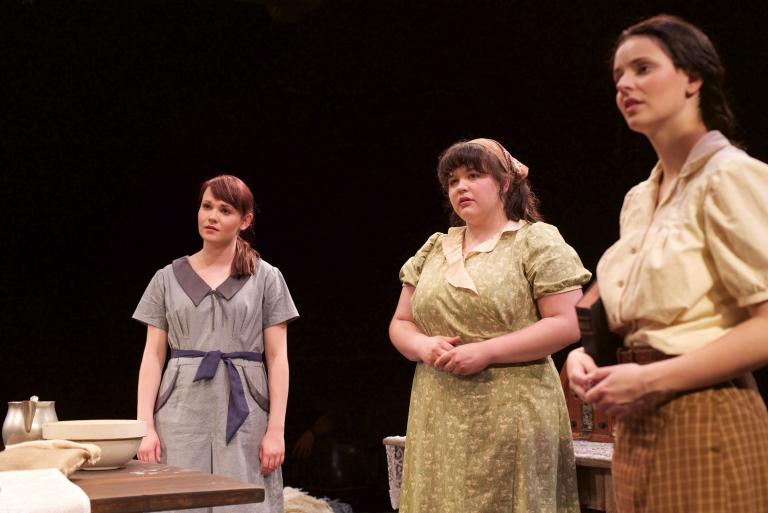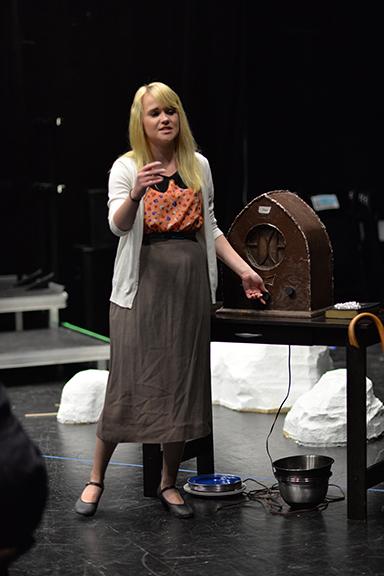
University Theatre opens season with "Dancing at Lughnasa"
calendar icon23 Sep 2015

Performances are Oct. 8-9 and 13-17 at 7:30 p.m. and Oct. 11 and 18 at 2 p.m. in the Studio Theatre, located on the first floor of the Temple Building.
Director Laura Lippman describes “Dancing at Lughnasa” as a “memory play,” told through the narrator, Michael, who was once a part of the world he describes, but has since escaped.
“He describes the events that lead to the fracturing of the Mundy family in the summer of 1936 in the town of Ballybeg in County Donegal, Ireland,” she said. “The events in the family home are triggered by the return of a family member from Uganda and the arrival of a new wireless radio set. These new additions are the catalyst for change, and the Mundy family will never be the same again.”
The play is narrated about 25 years later by Michael Evans, the son of one of the Mundy sisters, who recounts life that summer from his perspective at only seven years old. Michael is played by Trey Martinez, a junior dual major in performance and directing/ management in the Johnny Carson School of Theatre and Film from Omaha, Nebraska.
“I’m really excited to get to ‘play narrator’ in this piece,” he said. “I haven’t done too much work that involves speaking directly to the audience, so getting to create a relationship with them every night will be a lot of fun. Throughout the play the sisters have short scenes with young Michael, where they interact with an invisible boy. As adult Michael, I get to deliver the lines of young Michael while keeping in the character of the narrator. It’s a really cool concept, and I’m excited to get to play with that as well.”
In addition to serving as the narrator, Michael conjures up the memories for the audience.
“Through this character, I think Friel wants us to consider how our past plays a part in making us who we are,” Lippman said. “We may run from our family, as Michael tells us he does, but they are a part of us—sometimes in ways we cannot see until we’re older.”
Lippman said conceptually they are exploring the idea that the world of the play is like an old photograph.
“Whenever you hold an old photo in your hand, the images come to life in your mind and the memories (good, bad or however you remember them in that moment) take shape and in that moment, they live again,” she said. “Each person who looks at a photograph has a different experience of the memory—‘Dancing at Lughnasa’ gives the audience Michael’s memories of that summer of 1936.”
Friel’s convention for the narrator allows for the adult actor playing the role to be on stage, while his memories are played out before him.
“This means that the actors playing his aunts, interacting with him as a child, are challenged to create the image of the child Michael in their minds’ eye for the scene to work,” Lippman said.
Lippman and the design team have chosen to stage the play in an arena configuration, where the audience completely surrounds the stage.
“It is clear by Friel’s stage directions that the play was written for the proscenium, however, we are excited by the challenges arena provides and the elements arena configuration adds in order to tell this story,” she said.
Martinez said, “It’s an intimate space that, I think, allows the audience to get a little glimpse into the family’s life.”
They are not taking the set in a realistic direction. Rather, they are exploring the idea that memory is flexible and, at times, blurry.
“The set reflects the idea of memory and nostalgia while giving the cast a wonderful space to play and tell this story,” Lippman said.
Her cast consists of eight actors, including five women and three men. They range from freshmen to seniors.
“The cast is rising to the play’s many challenges, and each day we grow more and more as we create this work together,” Lippman said.
Martinez is also excited to learn the Irish dialect.
“So Far the process of learning the dealect of Northern Ireland has been really cool,” he said. “Our dialect coach, Sasha Dobson, is great at what she does. She schedules individual sessions with each actor and also sits in on rehearsals to make sure we’re sounding authentic.”
Lippman has not directed the play before, but did see a production of it at the Irish Repertory Theatre in 2012.
“The play has stayed with me since,” she said. “I’m thrilled to have the opportunity to dive into the script with the students here at UNL.”
She hopes audiences see themselves or some aspect of their families reflected back at them.
“Although the play is set in another time, and in another place, the characters are as real to the narrator Michael as they are to the playwright—in fact, the characters are based on people and events in Friel’s own life,” she said. “I hope that the audience comes away with a deeper understanding of how their families and their own memories (good and bad ones) help shape who they are, and who they may still become.”
Lippman said the play has a wide appeal.
“I think the play will engage students across campus-—in English, history, women’s studies, classics, religion and psychology,” she said. “I hope you’ll all come and check it out!”
She loves the text that Friel wrote.
“Friel is a remarkable playwright, and we discover more and more each night in rehearsal,” she said. “It’s a gorgeous story and watching the process unfold and the characters come to life on stage bit by bit has been wonderful.”
Tickets are $18 regular, $16 faculty/staff/seniors and $12 for students with ID. Advance tickets are available through the Lied Center Box Office at (402) 472-4747 or at the door one hour prior to the performance. Advance tickets are also available online at https://go.unl.edu/theatretix.